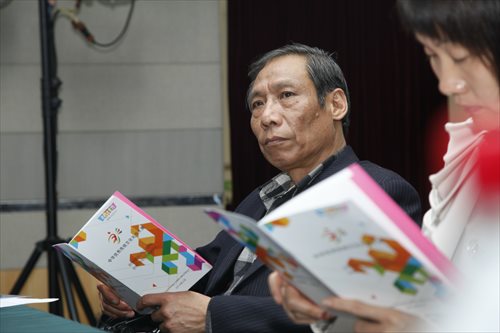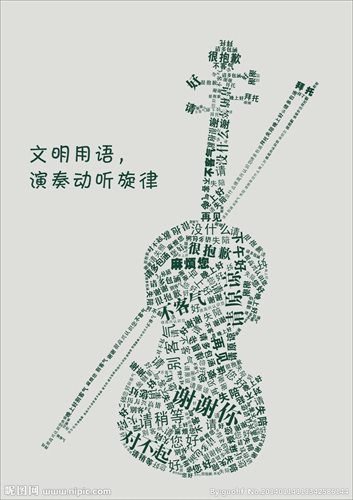HOME >> METRO SHANGHAI
Minding manners
By Sun Shuangjie Source:Global Times Published: 2014-7-13 17:23:01
Efforts growing to reform notions of traditional Chinese etiquette
A resurgence of interest in traditional Chinese culture has seen TV contests in which competitors vie to recite the most Chinese idioms or chengyu, and "spelling bees" in which children write Chinese characters.
Now, a Weibo account that aims to help people learn traditional Chinese etiquette and use it in their daily lives has been gaining popularity.
Over the past two months, the Chinese Traditional Culture and Etiquette Contest has been posting questions to its Weibo and WeChat feeds, such as, "which of the following can't be sent as formal presents: cigarettes and alcohol, books and paintings, or commemorative medallions?" The correct answer (in this case, "cigarettes and alcohol") is released the next day. In total, the contest has some 10,000 followers. Prizes include iPads, iPhones and VIP memberships to Sina Weibo.

People are also asked to submit photos, essays and videos that reflect their understanding of good Chinese etiquette, the best of which will be shown on the competition's website at chinawhcx.com, and at an end-of-year forum.

From August to December, the event organizer will cooperate with Shanghai local residential committees to present live performances that demonstrate Chinese etiquette. Meanwhile, experts from local colleges and universities formed a committee to publish a book on Chinese etiquette.
Time to take action
"It's high time that we rebuild good Chinese etiquette in our society," said Lou Shifang, deputy dean of the cultural industry department at Shanghai Institute of Visual Art and an academic committee member.
"Traditional Chinese culture has been subdued a couple of times in the past 100 years, meaning Chinese etiquette that had been cultivated for thousands of years has lost its way," Lou explained.
The social reform that derived from the May 4th Movement in 1919 is seen by some experts as the beginning of the collapse of traditional Chinese morals and etiquette. Some movement leaders called on people to demolish Confucian discipline and tradition. The Cultural Revolution (1966-76) was another devastating blow to traditional culture.
"The problem is so serious nowadays that society not only lacks proper etiquette, but also basic mutual respect among people," said Lou.
Xu Jilin, director of the Institute of Modern Chinese Thought and Culture at East China Normal University, sees eye to eye with Lou on this point of view.
An obvious symptom is the reluctance of Chinese people to say "sorry" or "thank you," according to Xu, who noted it as a lack of respect and sense of equality.
"Some people won't say thank you to waiters because they think they're paying for all they can get at the restaurant, and even some of them would behave as if they are of a higher status than the waiters," said Xu.
He divides etiquette into two kinds, one for public occasions and one for the private sphere.
"I have noticed that people of the older generation are good in private occasions but bad in public occasions, while those born in and after the 1980s are good in public manners while bad in private situations," Xu told the Global Times.
His reasoning is that the older generation is more used to living in bigger families, thus know better about how to deal with private relationships; but many didn't receive a good education in terms of public manners when they were young, thus they have poor etiquette in public situations.
"Confucian theory says the essence of morality is benevolence, which is realized through an etiquette system," Xu said. "Thus, the core of modern morality should be the respect a person holds to others from the bottom of their heart," said Xu.
No imitation
Experts believe that neither copying traditional Chinese etiquette nor attempting to imitate Western etiquette is the solution.
Good traditional Chinese etiquette should be advocated for a range of occasions, according to Lou. This includes etiquette for commemorating new births, marriages, deaths, and celebrating housewarming and traditional festivals.
Nowadays, many occasions place the host's boss as the most important figure at the event. However, according to Lou and Xu, this practice harms personal relationships and should be abandoned.
"We should make it a prevailing practice in society to promote good morality and etiquette, which should be done by the government, enterprises and communities working together," said Lou.
According to Chen Shusheng, manager of the company behind the Chinese Traditional Culture and Etiquette Contest, some 20 enterprises in the city have volunteered to support the contest with money and human resources.
"It may take time to see the efforts being rewarded, but at least we're trying. As long as we're cultivating something good, it doesn't matter how big it is," Chen said.
Now, a Weibo account that aims to help people learn traditional Chinese etiquette and use it in their daily lives has been gaining popularity.
Over the past two months, the Chinese Traditional Culture and Etiquette Contest has been posting questions to its Weibo and WeChat feeds, such as, "which of the following can't be sent as formal presents: cigarettes and alcohol, books and paintings, or commemorative medallions?" The correct answer (in this case, "cigarettes and alcohol") is released the next day. In total, the contest has some 10,000 followers. Prizes include iPads, iPhones and VIP memberships to Sina Weibo.

An expert in etiquette attends the opening ceremony of the Chinese Traditional Culture and Etiquette Contest in Shanghai. Photos: nipic.com and courtesy of Chen Shusheng
People are also asked to submit photos, essays and videos that reflect their understanding of good Chinese etiquette, the best of which will be shown on the competition's website at chinawhcx.com, and at an end-of-year forum.

From August to December, the event organizer will cooperate with Shanghai local residential committees to present live performances that demonstrate Chinese etiquette. Meanwhile, experts from local colleges and universities formed a committee to publish a book on Chinese etiquette.
Time to take action
"It's high time that we rebuild good Chinese etiquette in our society," said Lou Shifang, deputy dean of the cultural industry department at Shanghai Institute of Visual Art and an academic committee member.
"Traditional Chinese culture has been subdued a couple of times in the past 100 years, meaning Chinese etiquette that had been cultivated for thousands of years has lost its way," Lou explained.
The social reform that derived from the May 4th Movement in 1919 is seen by some experts as the beginning of the collapse of traditional Chinese morals and etiquette. Some movement leaders called on people to demolish Confucian discipline and tradition. The Cultural Revolution (1966-76) was another devastating blow to traditional culture.
"The problem is so serious nowadays that society not only lacks proper etiquette, but also basic mutual respect among people," said Lou.
Xu Jilin, director of the Institute of Modern Chinese Thought and Culture at East China Normal University, sees eye to eye with Lou on this point of view.
An obvious symptom is the reluctance of Chinese people to say "sorry" or "thank you," according to Xu, who noted it as a lack of respect and sense of equality.
"Some people won't say thank you to waiters because they think they're paying for all they can get at the restaurant, and even some of them would behave as if they are of a higher status than the waiters," said Xu.
He divides etiquette into two kinds, one for public occasions and one for the private sphere.
"I have noticed that people of the older generation are good in private occasions but bad in public occasions, while those born in and after the 1980s are good in public manners while bad in private situations," Xu told the Global Times.
His reasoning is that the older generation is more used to living in bigger families, thus know better about how to deal with private relationships; but many didn't receive a good education in terms of public manners when they were young, thus they have poor etiquette in public situations.
"Confucian theory says the essence of morality is benevolence, which is realized through an etiquette system," Xu said. "Thus, the core of modern morality should be the respect a person holds to others from the bottom of their heart," said Xu.
No imitation
Experts believe that neither copying traditional Chinese etiquette nor attempting to imitate Western etiquette is the solution.
Good traditional Chinese etiquette should be advocated for a range of occasions, according to Lou. This includes etiquette for commemorating new births, marriages, deaths, and celebrating housewarming and traditional festivals.
Nowadays, many occasions place the host's boss as the most important figure at the event. However, according to Lou and Xu, this practice harms personal relationships and should be abandoned.
"We should make it a prevailing practice in society to promote good morality and etiquette, which should be done by the government, enterprises and communities working together," said Lou.
According to Chen Shusheng, manager of the company behind the Chinese Traditional Culture and Etiquette Contest, some 20 enterprises in the city have volunteered to support the contest with money and human resources.
"It may take time to see the efforts being rewarded, but at least we're trying. As long as we're cultivating something good, it doesn't matter how big it is," Chen said.
Posted in: Metro Shanghai, Culture